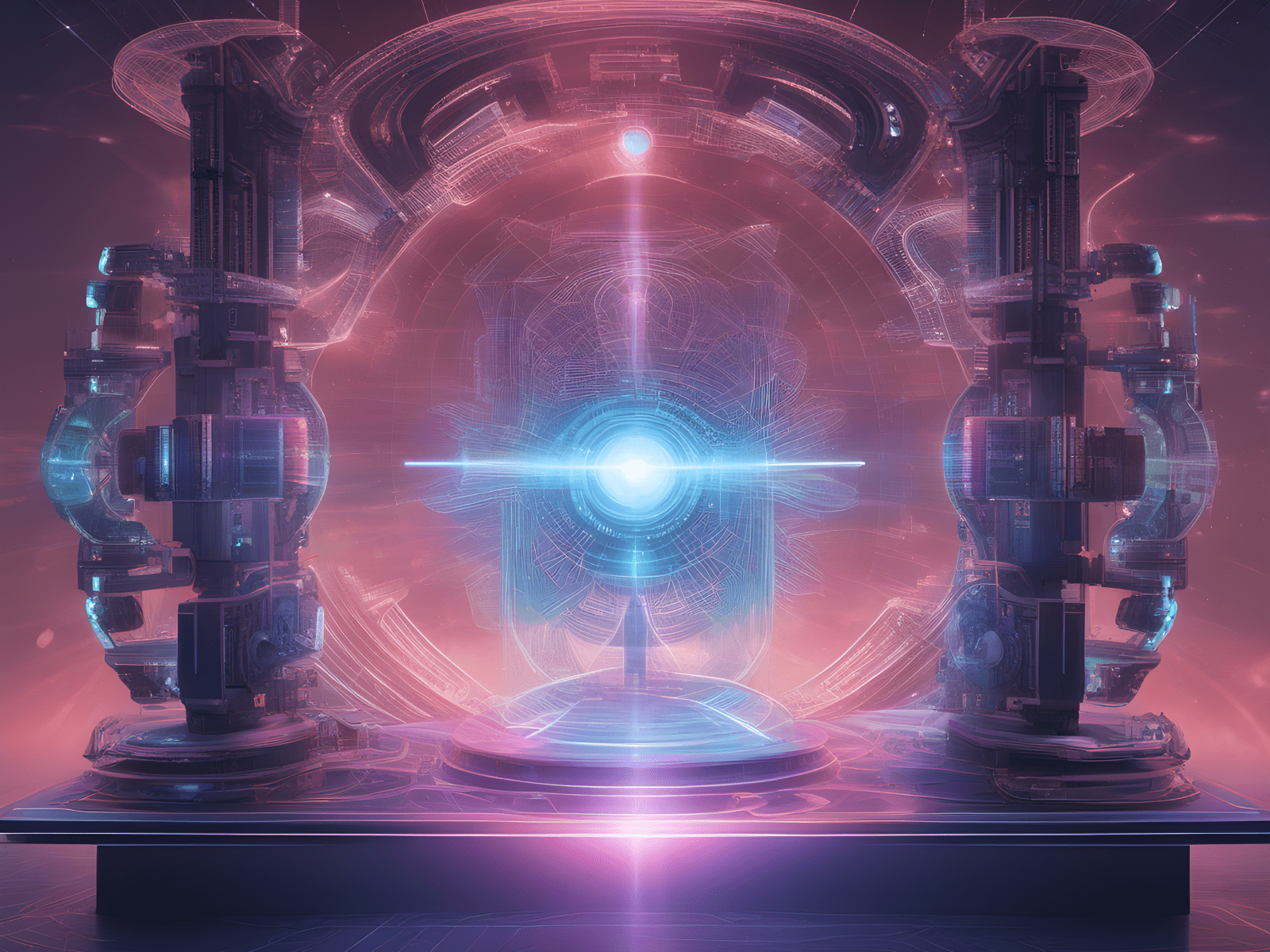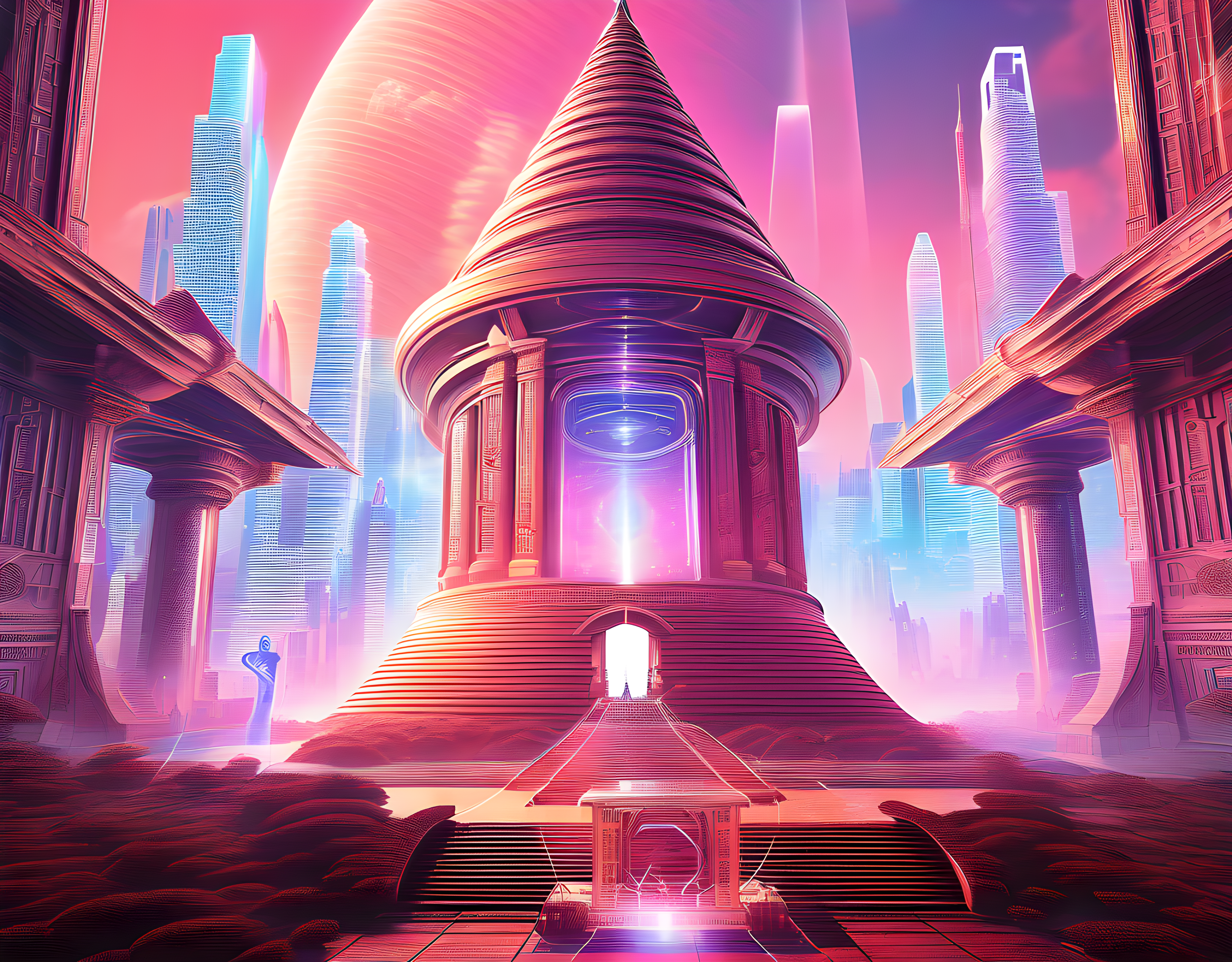You know, it's crazy how fast tech has changed the way we do pretty much everything. When I think about the way computers work, with all their rules and patterns, it's a lot like how our minds work.
So, this got me wondering: Can the digital world actually help us understand the deeper stuff, like who we are and why we're here?
I believe it can, and even as I have been developing this project Reality Designers - it has become cleat to me that technology can improve us on so many levels, we couldn't do before.
Every time I power up my computer, I feel like I'm stepping into another world. Literally, the internet has become it's own digital society, but more specifically I'm talking about computers themselves.
You see, computers can be difficult to understand at first, but once you get a grasp of the main ideas - everything more or less becomes components or variations of the same things over and over again.
Our reality, similarly is like this. I've learned so much about reality, just by learning about how to code and have come to a new type of appreciation for systematic logic and how structuring ideas offers the pathway to enrich the ideas into new forms.
So all day, I'm on a computer all day, and when I take a moment to just sit and think, it's a lot like when my computer takes longer than usual to process something. I'm trying to work through stuff, see what's going on in my head. Maybe I missed something, or maybe there's something I need to adjust.
There are certain memories and feelings I keep coming back to. It's strange how some things just stick more than others. But by looking at these patterns, I think I start to get a clearer picture of myself.
It's all connected somehow. It has to be structured in some way. And I believe this is what we all deeply feel. There has to be an inherent structure to this reality. But what is it?
During those deep thinking moments, there are times when everything suddenly lines up. Everything feels right. I'm not sure if that's what people call a spiritual moment, but it feels important. It's like catching a glimpse of the bigger picture, if only for a second or two. They come frequent enough to build an even larger picture, and this does help me process and see reality from a larger landscape.
Technology as an Extension of the Mind
I've been thinking a lot about whether technology can genuinely be a compass towards spiritual understanding. Here's how I see it: It's like having a toolbox. You've got all these gadgets and tools inside, but they're only useful if you know when and how to use them.
Similarly, technology offers a myriad of tools, platforms, and information. But just having them isn't enough. Just like I wouldn't use a debugger as the only tool to build a software project, I shouldn't expect technology alone to guide my spiritual path.
If I use technology right, though, it can amplify my understanding. It can connect me to ideas, cultures, and philosophies I might never have stumbled upon on my own. It can challenge me, make me question, and sometimes, even validate what I've felt deep down.
There's something about the tech world, its evolution, its adaptability, that provides a rich source of metaphors for life. It's like looking at an old piece of code and seeing parallels with past beliefs or views. Technology prompts me to rethink, to iterate on my beliefs, to optimize my understanding of life, and my place in it.
If you look at a piece of code, you'll find conditions, loops, and functions. Doesn't life feel the same sometimes? We face conditions daily, get stuck in routine loops, and every function or role we take on adds a new layer to our identity. It's as if
Reality Is Already A Video GamePOST or something.
But where does technology end and spirituality begin? For me, it’s not so much about distinguishing between the two, but rather understanding how one complements the other. There are moments when I'm deep in coding, lost in the lines and logic, and I suddenly hit a mental block.
The solution often isn’t found in more coding or debugging but in stepping back, taking a walk, or meditating for a few minutes. It’s in these moments of pause, of detachment from the immediate problem, that clarity often strikes.
I also can't help but draw parallels between the global network of the internet and the interconnectedness of human consciousness. Every device, every user, connected in this grid and exchange of information. Doesn't it echo the idea that we're all connected in some way, part of a larger whole? Each of us adding our unique data, our unique values to this collective consciousness.
And what about Artificial Intelligence? It’s kind of crazy to see machines learning, adapting, and even exhibiting behaviors that we'd typically label as 'human.' This challenges and stretches my understanding of consciousness. If a machine can learn, adapt, and maybe one day even "feel", what does that say about the nature of consciousness?
So we got computers, phones, tablets, even computers are in street signs and places you wouldn't expect. Some say like a virus, that technology and all these EMF frequencies will be the end of civilization.
I've never seen it that way as I've always tried to use the internet as a portal into the world of the unknown and make it known. I suppose you have to love learning to be this way, but it is a growing trend many people are finding to work especially in the time we're in now. When I think about how large the internet is, honestly it's very hard to actually comprehend the scale of any of it.
The internet is this massive space, almost like an endless library. I sometimes wonder how it's shaping my view of everything. Does having all this knowledge at my fingertips simplify things for me, or just add layers of complexity, while providing me with surface level and easy to install perceptions?
When I'm coding, I often find myself piecing together snippets to create something functional. It feels a lot like how I sometimes piece together bits of information from the internet, trying to get a more transparent view of whatever's on my mind.
And just as in coding, where not every snippet or function fits perfectly, not all information aligns with my current understanding. Yet, the act of gathering, processing, and integrating shapes the way I see things.
Going through all this data, sometimes there's this one article, video, or even a random comment that just clicks with me. It's weird. It's like stumbling upon a hidden feature in a program. It might challenge what I've known, push my boundaries a bit, or it might be like a "Eureka!" moment where everything suddenly makes sense. Those are the bits that stick, the ones I ponder over when I'm away from the screen.
And when something does resonate, it starts this internal dialogue. Why did that particular thing catch my attention? How does it fit into what I already know or believe? Sometimes, it even feels like debugging my own thoughts, tracing back to where a belief originated and checking if it still holds up. It's introspection, but triggered by external bytes of data.
Thinking about the apps on my phone, the suggestions that pop up, and all the platforms trying to connect us, I see them as more than just tools. They're like external extensions of my thought process. Used mindlessly, they're just distractions, but if I engage with them with purpose, they can be pathways to some genuine insights. Kind of like how a tool in coding, say a debugger, can either be used routinely or can deeply transform how I approach a problem.
Tech, at its core, is about connections and extensions. It plugs me into experiences, cultures, and ideas I might never encounter in my physical world. It's not just about algorithms or data; it's about expanding my human experience. And in that digital web of connections, I sometimes catch glimpses of something larger than me, larger than all this code and data. It's fleeting, but it's there.
With every click and every scroll, the potential for growth is just around the digital corner
I often think about how each interaction online, every article or video, has the potential to add something to my understanding. It's kind of like how in coding, every line I write, or every piece of feedback from the compiler, brings me closer to my end goal. But here, the goal isn't just a functioning piece of software, it's about personal growth, understanding, maybe even wisdom.
The Balance of Material and Spiritual
There's this pull I feel between the very real, concrete world of tech and the more abstract, intangible realm of spiritual matters. When I'm in front of my computer, coding, there's this dance between making things simple enough to be understood and efficient, but complex enough to handle the task at hand. It's a balancing act, and I guess life is pretty much the same. With all the tech around, it's easy to think it might have all the answers, even to those big, heavy existential questions. But then, I catch myself.
Sure, technology is powerful, and there's so much out there that can guide us, enlighten us in some ways. But when it comes to the core of spiritual growth, it feels deeply personal.
Just like you can't always copy-paste code from one program to another and expect it to work flawlessly, you can't expect an app or an algorithm to do all the spiritual heavy lifting for you. There's no one-size-fits-all solution.
But here's where it gets interesting. If I use technology as a tool, not a crutch, it can actually help bridge the gap between what's tangible and what isn't. It's like taking the first step into a new project, unsure of where it'll lead, but excited about the possibilities.
With tech as my friend and especially now with AI as my partner ready to follow any thought I have - I venture into understanding truths that are timeless, that go beyond pixels and data.
There's something out there, bigger than the binary world, and I'm just starting to tap into it. And being a technologist - I believe I probably only would of came to this conclusion because I am so involved in tech. Technology made me conscious.





